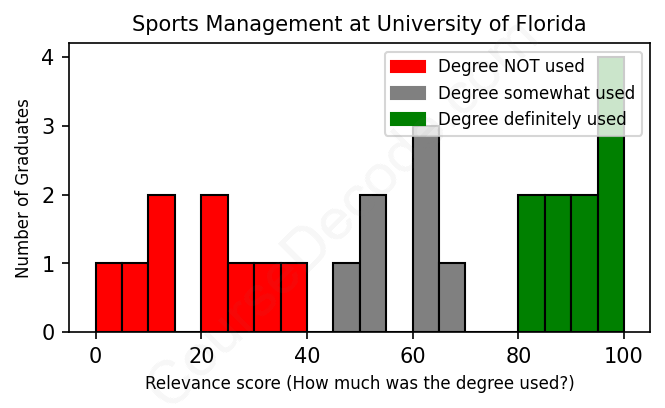
First, some facts. Of the Sports Management graduates from University of Florida we've analyzed , here's how many have used (or NOT used) their degree in their career:

These are estimates based on AI analysis of 26 LinkedIn profiles (see below).
The verdict? Below average. Overall, with an average relevance score of 57%, Sports Management graduates from University of Florida have a lower likelihood (-10%) of finding work in this field compared to the average graduate across all fields:
And for comparison, here's the chart for all profiles we've looked at across all degrees.
Also, after graduating, only 30% of these graduates have pursued further education other than another Bachelor's degree (such as a Masters degree or other), compared to the average across all profiles of 35%. This suggests a Bachelors degree is enough for most Sports Management graduates, and it's normal to look for work straight after graduation.
See the details:
|
Relevance score: 27% We think this person has NOT gone into a career related to their degree. We think this person has NOT gone into a career related to their degree.
DEGREE INFOGraduated in 2019 from University of Florida with a Bachelor of Science - BS in Sports Management. No other secondary education since. JOB HISTORY SINCE GRADUATIONArea Manager Amazon Jun 2020 - Feb 2021 Property Claims Adjuster  Allstate Feb 2021 - Feb 2022 Army Officer  Florida National Guard Aug 2019 - Present Regulatory Compliance Analyst  EY Feb 2022 - Jul 2023 Senior Regulatory Compliance Analyst  EY Jul 2023 - Present ABOUTI am passionate about using critical thinking skills to solve simple and complex problems.Working in the National Guard as an Officer, I get the opportunity to work directly with soldiers I supervise in a way that helps me learn how to solve problems that do not always have clear answers, but explain it to Soldiers in a way that we have a shared vision of the desired end goal.I am looking for positions that will develop and progress my career in AML functions. |
The top 10 most common jobs done by the graduates we've analyzed (ranked most common to least) are:
When looking at the types of jobs held by individuals with a Sports Management degree from the University of Florida, there’s a clear mix of roles that are directly related to sports management and others that seem to stray pretty far from that path. Many graduates have landed positions that are squarely in the sports industry, like various intern roles with professional teams, account executives, and membership services positions. These jobs typically require specific skills related to managing sports events, client relations within sports teams, or marketing initiatives related to sports organizations. It’s great to see that many graduates are applying their education in ways that feature core competencies they learned in school, especially in roles with teams like the Tampa Bay Buccaneers or even in internships at places like the NFL and minor league teams.
However, it’s a bit concerning that quite a few graduates have taken roles that don’t directly align with their degree. You can find alumni working as real estate agents, insurance agents, and even in various administrative roles unrelated to athletics. While these positions might draw on some general skills in communication and customer service, they don’t really leverage the specialized knowledge that comes from a Sports Management program. So, while there are definitely strong connections between many jobs and the field, it seems like a noticeable number of graduates are taking winding paths away from the sports industry altogether, which raises questions about how well the degree prepares students for specific career trajectories in sports management.
Here is a visual representation of the most common words in job titles for Sports Management graduates (this is across all Sports Management graduates we've analyzed, not just those who went to University of Florida):

Graduates from the University of Florida with a degree in Sports Management seem to have a variety of career paths, ranging from positions directly within the sports and athletic industry to jobs in unrelated fields. For many, their first jobs post-graduation are typically internships or entry-level positions within sports organizations, often in sales, marketing, or operational roles. These initial experiences often help them build valuable connections and gain industry-specific skills. However, as we can see, some graduates also veer off into other professions, like real estate, insurance, or marketing, which might not relate closely to their studies.
Fast forward five to ten years, and their career trajectories are quite mixed. While some individuals have advanced within the sports industry, taking on roles like Account Executive, Coordinators, or Equipment Managers at various teams and organizations, others have shifted gears entirely into roles like real estate agents or even zookeepers. Many of those who stay within the sports field tend to climb the ranks into more senior positions, or even venture into management roles. On the other hand, there are also those who, despite starting strong in sports-related jobs, have ended up in seemingly unrelated fields. Overall, while there are success stories in sports management, there’s a noticeable divide, indicating that while the degree provides a stepping stone into the sports world, it's not a guaranteed career filter. It's definitely an interesting mix of passion and practicality!
Honestly, a Bachelor's degree in Sports Management can be a mix of challenges and fun, and at the University of Florida, it's pretty much the same. While some classes might be more straightforward, like introductory courses that focus on the basics of sports and business, others can get a bit tricky, especially when you dive into finance or analytics related to sports. Overall, it's not the hardest degree out there, especially if you're passionate about sports, but you will have to stay organized and keep up with assignments and projects. If you enjoy teamwork, leadership, and getting into the nitty-gritty of how sports organizations operate, you should find it pretty manageable!
Most commonly, in the LinkedIn profiles we've looked at, it takes people 4 years to finish a Bachelor degree in Sports Management.
Looking at the career paths of these Sports Management grads from the University of Florida, it seems they've had a pretty mixed bag when it comes to making decent money. Some of them have landed solid roles in industries like real estate and insurance, which can pay quite well, especially as they progress in their careers. Others, like those in internships and entry-level positions, might be starting off on the lower end of the salary scale. The more established folks, particularly those in significant roles with sports teams or the ones running their own businesses, seem likely to be doing pretty well financially. So, overall, while some are probably raking it in, others might still be working their way up the ladder and figuring things out.
Here is a visual representation of the most common words seen in the "about" section of LinkedIn profiles who have a Bachelor degree in Sports Management (this is across all Sports Management graduates we've analyzed, not just those who went to University of Florida). This may or may not be useful:

Here are all colleges offering a Bachelor degree in Sports Management (ordered by the average relevance score of their Sports Management graduates, best to worst) where we have analyzed at least 10 of their graduates: